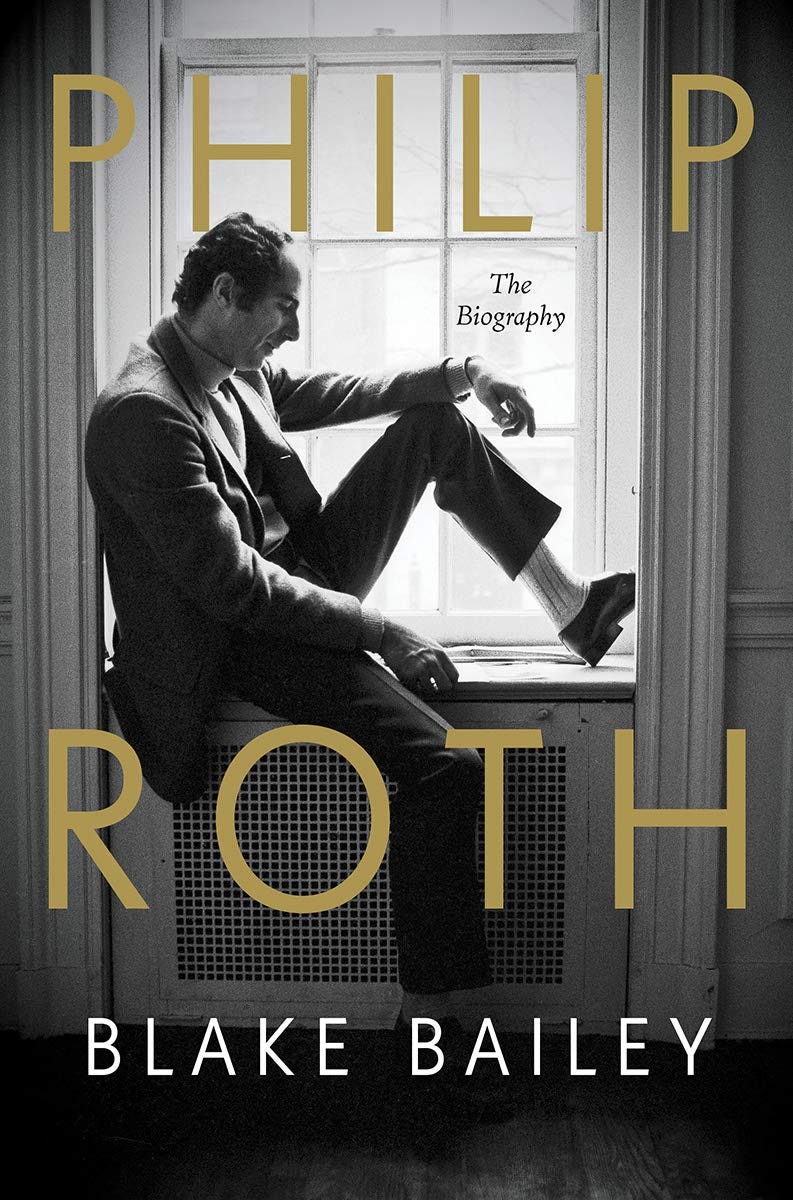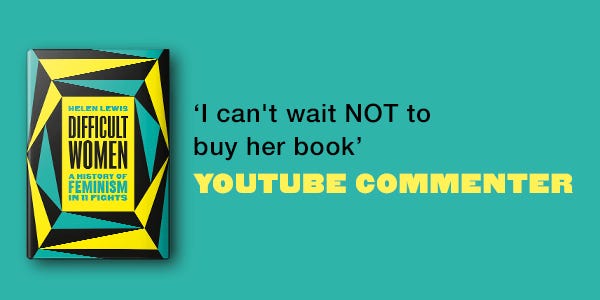Happy Friday!
I thought I didn’t have anything to say this week, but I was wrong.
Helen
PS. Catch me on the News Quiz tonight, Radio 4, 6.30pm.
The Literary Master as Aggrieved Playboy (New York Times)
There’s another version of this story. At a panel on [Philip] Roth, held a year after his death in 2018, [his biographer Blake] Bailey recalled the interview but added a detail that he doesn’t include in the book. Again, Roth quizzed the gentile from Oklahoma, again he produced the album of girlfriends. But then the conversation turned to the Hollywood adaptations of Roth’s work. Bailey mentioned Ali MacGraw, who starred in “Goodbye, Columbus.” (He thought she was “just wow.”)
“I could have taken her out,” Roth said.
“My God, man, why didn’t you?” Bailey asked.
“OK,” Roth replied. “You’re hired.”
One of the things I really want to write about in my next book—but have no grip on yet—is the circlejerk nature of constructing a “genius”. Artists, critics and academics live in this unholy symbiosis, bolstering each other, raising all their profiles together. The talent-spotter and the young turk. The dead master and the keeper of the flame. The literary criticism industry and its great wellspring, the garlanded author.
Here’s how it goes, too: The artist grants a biographer special access. The biographer repays him with a depiction which might be unflattering, but still, by its very existence, testifies to his genius. (This was my issue with James Graham’s Brexit: The Uncivil War.)
The publisher of Blake Bailey’s Philip Roth biography has now stopped shipping copies, because Bailey has been publicly accused of rape and other sexual offences, which he denies. This is panicky reputation management: One of the accusers had emailed the publisher privately, ahead of the book’s release, to tell her story and the publisher… forwarded the email to Bailey. He emailed her, asking her not to go public.
Inevitably, I have now bought the book, because there’s something compelling about the #MeToo-ing of the author of a biography of a writer often accused of luxuriating in misogyny. The New Republic review, published before the allegations became public, argues that Bailey, presumably with Roth’s blessing, consistently depicts women as “forever screeching, berating, flying into a rage, and storming off, as if their emotions exist solely for the purpose of sapping a man’s creative energies.” It’s also worth reading Ruth Franklin’s thread on Bailey’s chauvinist review of her Shirley Jackson biography. There’s a thread here about men reinforcing each other’s belief that it is the role of women to be selfless carers, and to blame any inadequacy—literary or sexual—on women having needs and desires of their own. (As the NR’s Laura Marsh notes, a less sycophantic biographer “could have uncovered the messier reality of [his relationships] and shown how Roth selected from it his preferred “facts,” but [Bailey] doesn’t go to the trouble of finding out what any of the women experienced.”)
Assuming that other people think like me, I imagine sales have spiked since the stories came out. (Mind you, how’s this for a bittersweet Amazon review? “Blake Bailey maybe a rapist but this is a great book.” Shame there won’t be a paperback which can use that as a cover quote.) For all that we all deplore “cancel culture”, it looks like Roth chose his biographer because he was sympatico his Ali McGraw-banging-banter. He silently cancelled anyone who might challenge his chauvinism. Personally, I think the Bailey book should be available to buy for exactly that reason—both men involved have told on themselves—but we should also be free to note that the history of literature is full of men giving each other reputational handjobs like this.
On a related note, Sirin Kale—who is shaping up to be one of our best emerging journalists—has put together an extraordinary portrait of Noel Clarke’s behaviour. Two things stand out: first, his poundshop auteur pose (writer, producer, director, lead actor) appears basically to have allowed him to star in his own sexual fantasies, casting women he found hot and making sure there were plenty of nude scenes. Whether or not his behaviour has been illegal, that’s a dynamic that’s obvious throughout the TV and film industry, but very difficult to formulate in words. (“Who does my penis think should be the lead?) Kale and her co-reporter Lucy Osborne have done a skilled reporting job in capturing the details.
Second, the woeful inability of our present institutions to deliver due process and proportionate punishment—something which is just as important whether the accused is innocent or guilty. The top of this story has an odd focus on Bafta, which heard about the allegations before publication, but says it had no evidence with which to investigate them. Upon publication, the stance immediately switched to suspending Clarke. Now, you might argue, why should a (glitzy) trade body be the one charged with investigating complaints by scattered, freelance, junior workers in a fragmented industry? And that’s a fair point, but . . . someone has to be, surely?
Every piece like this which makes it to print is both a triumph (brave complainants have come forward and demonstrated their case to a level that satisfies a media lawyer) and a failure. Both because it happened at all, and because public opinion is a fickle court in which to adjudicate these kinds of questions. At the moment, with the entertainment industry, we get this binary flick between “nothing to see here” and “THROW HIM TO THE WOLVES”, which is driven by the organisations’ own reputational imperatives.
Not everyone who gets accused like this will be guilty—or perhaps not guilty of absolutely everything on the charge sheet. And even for the bang-to-rights, there’s no guide to what an acceptable punishment might be, or whether rehabilitation might be possible. Feminist campaigners like Julie Bindel have argued against longer sentences for rapists—a perennial favourite idea of hang ‘em and flog ‘em right-wingers—because they make juries even more reluctant to convict. We have the same problem #MeToo and bullying cases, because there is no incentive to admit to anything, when the punishment is vast and nebulous and potentially perpetual.
What does due process look like? It’s been nearly four years since the Weinstein story broke, and he’s one of the few accused men who has faced a court. In a better world, we would have safeguards against the power plays which allow these abuses to happen in the first place—to ensure that the first instance is properly dealt with, and there isn’t a second, a third, a twentieth. How do we change the system?
Common to both the Roth/Bailey and Clarke stories is misogyny as a bonding tool for insecure men. That doesn’t get talked about enough. Whether it’s “lol m8 you could have banged Ali McGraw” or “lol m8 come watch these strippers on my set”, there’s a type of objectification of women that functions as a status symbol. Who da man? The many, many men I know who don’t act in this way seem more . . . mature than the very few who do. There’s something teenage and desperate about it.
Please Enjoy Gary Oldman Mentally Firing His Agent


Quick Links
Aerospace engineer Judith Love Cohen took a computer printout of the problem she was working on to the hospital when she went into labour with her fourth child. She phoned her boss that night to say she’d solved it… and the baby had been born. The baby would grow up to be Jack Black. (Kottke)
“To get slander removed, many people hire a “reputation management” company. In my case, it was going to cost roughly $20,000. We soon discovered a secret, hidden behind a smokescreen of fake companies and false identities. The people facilitating slander and the self-proclaimed good guys who help remove it are often one and the same.” (New York Times)
There’s a woman on TikTok who reposts recipe videos with a voiceover talking about how she found out her husband is cheating. The latest update is a bag of yikes. Is true? I can’t say. But what a crazy-compelling storytelling mechanism this is.
Belgian man parks in garage only 6cm wider than his car.
Further parking news, which makes me proud to be a south-east Londoner.
See you next time!






Hi Helen, Graham Linehan wasn't taking the piss out of the appearance of trans identified men when he went onto the Her dating app. He was exposing the fact that trans identified men were going onto the site, sometimes wearing female clothes, sometimes not and calling themselves lesbians which is dangerous and insulting to gay women. I think you know that. Its such a shame that you have stooped to that level. I'm unsubscribing from Blue Stocking now, this isn't fair and certainly isn't accurate journalism.